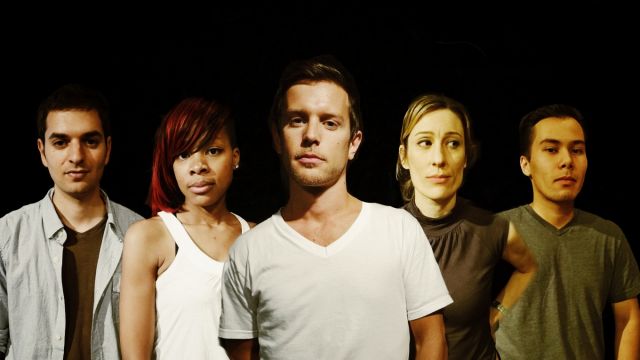
In October 1998, 21-year-old Matthew Shepard was brutally attacked and left for dead, bound to a fence in the outskirts of Laramie, Wyoming. Shepard eventually succumbed to the injuries inflicted upon him in an act of homophobic violence. Soon after the murder, members of NYC's Tectonic Theater Project, including the group's artistic director Moisés Kaufman, visited Laramie to interview community members about the profound effects of the event. The collected testimonials resulted in The Laramie Project, a play that became a celebrated HBO film. Ten years later, Kaufman and his collaborators returned to the city to examine how Shepard's death affected Laramie and its community over the past decade.
Now, for the first time in Montreal, Brave New Productions will perform The Laramie Project: 10 Years Later. Premiering on October 12—the fourteenth anniversary of Shepard's passing—the production contains the testimonials of over seventy different Laramie residents, including the two men charged in Shepard's death. In the week leading up to Montreal's premiere, NIGHTLIFE.CA spoke with Donald Rees, the founder and creative director of Brave New Productions.
Nightlife.ca: Many of Brave New Productions' previous works were quite fun and effervescent. This new play is radically different in terms of subject matter and mood. What drove you to take Brave New Productions in this direction?
Donald Rees: I think we've tried to challenge ourselves with every new show, and something like The Laramie Project: 10 Years Later is a piece we could never have possibly done before. We've grown over the past nine years. It's also nice to show another side of the team we've put together. A lot of our actors have excelled in comedic roles but have been itching for a chance to chew on drama.
What kind of challenges do you face with twenty actors playing over seventy different characters?
Those are two totally separate challenges—twenty actors and seventy characters. For the characters, it was just a matter of being extremely prepared before rehearsals even started. As for the actors, bringing on board talented, responsible performers was key to a successful rehearsal process. All of the cast members were deeply committed to researching their roles and staying on top of them, which is a huge undertaking since all of the characters are based on real people currently living in Laramie, Wyoming.
Credit: Donald Rees
Do you find any insight from performing the perpetrators' testimonies?
We've worked hard to try and play Matthew's murderers as honestly as we can, going so far as to dig up archival footage and hard-to-find interviews. The text and their words speak for themselves, and we allow the audience to come to their own conclusions. Personally, it was amazing to see how the two testimonies differed. Aaron McKinney and Russell Henderson are not the same person and their words are fascinating. You step into their minds for a few minutes and it's not what you'd expect.
Is there any indication of how or if the prison system inspires change or remorse?
That's a great question. In fact, there's far more than indication. The question is asked outright in the script. When Aaron and Russell were interviewed, they'd been in prison for a decade and transferred a handful of times. The challenges and success of their time in captivity are brought to light in the show.
Within all of the interviews that took place, is there a testimony that stands out to you as being particularly revealing?
There's a particular scene in the first act where Matthew's father Dennis is speaking at a bench dedication ceremony at the university in Laramie. The whole moment comes across as depressing and disappointing but also simple and honest. Ten years later, so many promises and the only testament to Matthew's legacy appears to be a bench.
There is no shortage of violence enacted upon all kinds of queer folks here and around the world. What makes this specific case so captivating for audiences?
I can't think of another case where success and failure can be measured so accurately. Laramie had hope in 1998, and its citizens promised change and tolerance. This is a post-mortem on a city that promised to act. Has it? The answers aren't black and white, but trying to figure out a method of measuring those answers will keep the audience involved long after they've left the theatre.
What is the significance to The Laramie Project, and perhaps to its larger themes in general, that this work be described as an “epilogue”?
The Laramie Project is, on the surface, about Laramie, Wyoming. The reality is it could be a story about Toronto or a story about Montreal. It happens to be a story about a gay hate crime, but the reactions and opinions could apply to many other types of scenarios and crimes. It's hard to leave the show and not wonder about our own successes and shortcomings.
The Laramie Project: 10 Years Later
From October 12 to 14
Art Neuf, Parc Lafontaine | 3819 Calixa-Lavallée | bravenewproductions.com